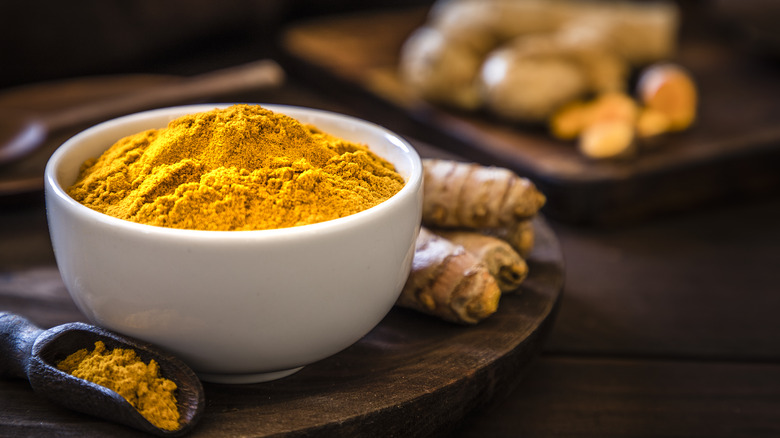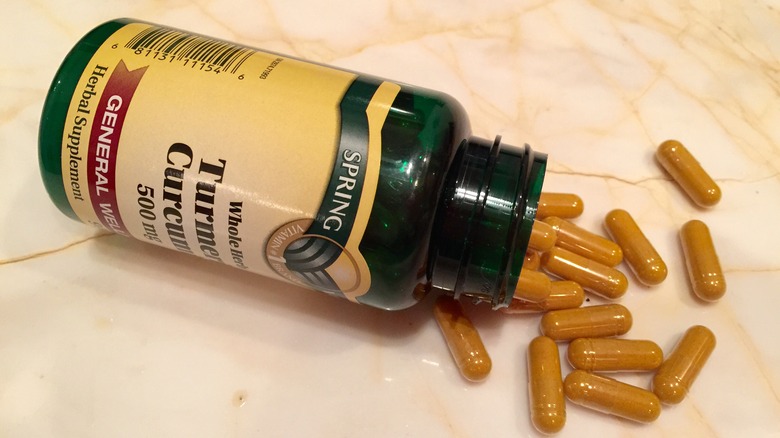Is This Popular Spice An Effective Alternative To Ibuprofen? What Doctors Say
Ibuprofen is a popular and effective nonsteroidal anti-inflammatory drug (NSAID) that many of us turn to for pain relief, bringing down a fever, and tackling something like delayed onset muscle soreness (DOMS) after a particularly grueling workout.
However, taking ibuprofen daily comes with negative side effects. Chronic use of this drug has been associated with gastrointestinal issues like diarrhea, bleeding, nausea, ulcers, and an upset stomach. This is because regular ibuprofen use can affect your gut health. Other health concerns that come with overuse of this NSAID are heart failure, high blood pressure, kidney damage, liver toxicity, and stroke.
With more and more people looking to alternative methods to combat pain with lifestyle practices like yoga, breathing exercises, and overall diet tweaks, one popular spice, in particular, has come to the forefront. We're referring to the mildly aromatic and deep spicy yellow turmeric. Native to Southeast Asia but popular worldwide, turmeric belongs to the ginger family. According to a 2014 study published in Dove Press Clinical Interventions in Aging, the main active component found in turmeric, curcumin (more specifically, curcuma domestica extracts), taken at 1,500 milligrams a day for four weeks, was found to be as effective as ibuprofen in treating pain in primary knee osteoarthritis patients. Similar conclusions were drawn in a 2021 systematic review of 10 studies published in BMJ Open Sport and Exercise Medicine. A 2015 study published in the European Journal of Applied Physiology found that oral curcumin consumption could alleviate DOMS.
How does turmeric combat pain?
Dr. Jyotsna Nagda, a pain specialist at Beth Israel Deaconess Medical Center, shared (via TIME) that turmeric's anti-inflammatory properties are what help with pain relief. And it's not just its main active ingredient, curcumin (which gives this popular spice its characteristic yellow hue), that works in the pain relief department. Per registered dietitian nutritionist Katherine Zeratsky (via Mayo Clinic), noncurcumin compounds found in this spice — turmerin, turmerone, elemene, furanodiene, curdione, bisacurone, cyclocurcumin, calebin A, and germacrone — are also thought to possess anti-inflammatory benefits.
Some experts also think turmeric can help with pain because of how it affects your gut microbiota and how it regulates microglia activation. According to European board-certified anesthesiology and intensive care specialist and pain medicine specialist Dr. Tural Bayramov, "Microglia are immune cells in the brain that play a role in neuroinflammation and chronic pain. Curcumin has been shown to regulate microglia activation, which may help reduce chronic pain associated with neurodegenerative diseases" (per Algoloji Uzmanı).
For someone dealing with chronic pain, this spice can start to feel like a godsend when you look at the research. Does this mean they should drop ibuprofen and turn to this spice that's been a popular medicinal ingredient in Ayurveda and traditional Chinese medicine for years?
Turmeric vs. ibuprofen for pain relief: Things to think about
You can derive the beneficial properties of the spice by consuming it in its powdered form or as a supplement.
But dosing matters, whether you're thinking of turmeric for pain relief or ibuprofen, per certified chiropractic sports physician Lisa Goodman (via Washington Park Chiropractic). Curcumin, which is what science has studied the most for pain relief, should be in high concentrations when it comes to supplements. While studies point toward 1,500 milligrams a day, supplements could contain as little as 50 milligrams, shared the expert. "It is so easy for supplement companies and brands to throw a little bit of a good herb in there, but in far less than therapeutic doses." Speaking of dosing, however, there is such a thing as too much turmeric. High doses can cause gastrointestinal discomfort, liver damage, and kidney stones in those who are susceptible. It is always best to consult with your doctor if you're thinking about switching from ibuprofen to turmeric supplements in an effort to combat chronic pain. The dosage might depend on your particular health concern.
For cooking, find the most organic variety. Avoid adulterated and cheaper versions to make sure you're not ingesting potentially problematic ingredients like food colorants and lead. The spice can be added to smoothies, curries, or consumed with milk, honey, and a pinch of black pepper. Turmeric is also thought to interact negatively with certain medications, like anti-clotting pills and medications for cancer. Once again, this is something you're going to have to discuss with your physician.



